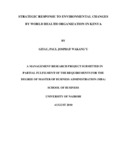| dc.description.abstract | Strategic response has been an important concept in strategic management by commercial organizations over time. However it is only in recently that the concept started getting attention by non profit organizations managers who have to contend with unprecedented challenges resulting from major micro and macro environmental changes. Survival and success of these non profit organizations calls for crafting and deployment of appropriate response strategies. Industry, political, economical, social -cultural, technological, ecological and legal forces influence operations in non profit organizations forcing them to seek for appropriate response strategies for survival and growth. Dynamism in business environment makes some past successful strategies to be obsolete forcing managers to modify them or craft new ones in order to keep abreast with the environmental changes.
The objectives of this study were to investigate how business environmental changes affect World Health Organization in Kenya and what response strategies the organization is adopting. In order to achieve these objectives, the investigation was designed as a single case study. The study involved collection primary and secondary data. The primary data mostly qualitative was collected by means of a semi structured interview guide where members of senior management in the organization were interviewed, while the secondary data came from review of documents, reports and policies.
The interview guide provided the principal source of the data. In order to corroborate the findings from the interviews, content analysis of relevant documents, reports and policies coupled with physical observation of the operations at the organization was undertaken. The case study results indicate that the concept of strategic response is partially appreciated at the World Health Organization in Kenya and that the organization employs a combination of different strategies across the organization. In addition the findings shows that the extent of implementation of these strategies in not uniform across the various programs and hierarchical levels in the organization.
Crafting and adopting of appropriate response strategies is at a more advanced level at the organization's Headquarters level than at the country office. For instance while the strategic direction from the headquarters is for more collaboration and cohesion with other United Nations agencies in the country, WHO country office is yet to fully embrace the strategy.
Overall though the country office has taken some steps toward embracing appropriate strategic response especially as appertains to strategic relationships with other organizations mainly non profits outside the United Nations system, weak environmental scanning hinders the crafting and adoption of appropriate response strategies in line with the environmental changes. Other strategies being partially employed at the country office includes organizational learning, focus and differentiation strategies. | en_US |

